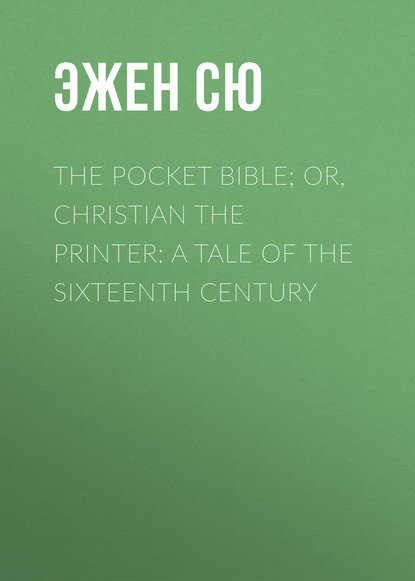По всем вопросам обращайтесь на: info@litportal.ru
(©) 2003-2025.
✖
The Pocket Bible; or, Christian the Printer: A Tale of the Sixteenth Century
Настройки чтения
Размер шрифта
Высота строк
Поля
Protestant marriage service, according to the Psalms of David; translated into French by Clement Marot, Geneva.
39
History of the Town of Paris, by Dom Felibien, of the congregation of St. Maur; Paris, 1725, vol. V, p. 343. Also given in the Registers of the Town Hall of Paris, and the Registers of the Parliaments, folios 507-686.
40
Dom Felibien, History of the Town of Paris, vol. V, pp. 343-347; French Ceremonial, pp. 940 and following; Registers of the Town Hall of Paris, etc.
41
De Thou, History of France, book I, p. 271.
42
These monstrosities seem to exceed the boundaries of the possible. Let us quote literally the text of the historians:
"On the evening of the same day (January 21, 1535) the six culprits were taken to the parvise of Notre Dame, where the fires were prepared to burn them. Above the pyres rose a sort of scaffolding on which the patients were tied fast. The fire was then lighted under them, and the executioners, GENTLY slacking the rope of the lever, allowed the miscreants to dip down to the level of the flames, in order that they be caused to feel the sharpest smart; they were then raised up again, kept hanging ablaze in midair, and, after having been several times put through that painful torment, they were dropped into the flames where they expired." (History of France by Father Daniel of the Society of Jesus, vol. IV, page 41, Paris, 1751.)
"On the said day (January 21, 1535) in the presence of the King, the Queen and all the court, and after the aforesaid remonstrances, the six heretics were brought forward to make the amende honorable before the church of Notre Dame of Paris, and immediately after they were burned alive." (Acts and Deeds of the Kings of France and England, by Jean Bouchet. Poitiers, 1557, in-folio, pp. 271-272.)
"In order to purge their sin, the said heretics were burned to death on the said day (January 21, 1535) at several places, as the King passed by, while in vain the poor sufferers cried and implored him for mercy." (History of the State of Religion, by Jean Sleidan. 1557, vol. IX, p. 137). (Quotations from Catholic works.)
43
Exhortation of the King of France against the Heretics, Jean Bouchet, Poitiers, 1557, in-folio, p. 272.
44
On the subject of this decree, which was later forcibly annulled, see Extracts of the Registers of the Parliament of Paris, LXXVI, folio 113, collated and extracted by M. Taillandier. – Cited in the introduction to the History of the Printing Press in Paris, Memoirs of the Society of Antiquaries, vol. XII.
45
It was no infrequent occurrence to cause the tongues of heretics to be cut out, in order to prevent them from confessing aloud the Evangelical doctrine as they marched to the stake. – See the following citation, from Theodore of Beze.
46
"Among those burnt at Paris that day, January 21, 1535, were: John Dubourg, a merchant-draper of Paris, living in St. Denis Street, at the sign of the Black Horse; Etienne Laforge, of Tournay, but long an inhabitant of Paris, a man very rich and very charitable; a schoolmistress named Mary La Catelle; and Anthony Poille, an architect formerly of Meaux, and blessed of God in that he carried off the palm among the martyrs, for having been the most cruelly treated. He had his tongue cut out, as more fully it is set forth in the book of the martyrs." —Ecclesiastical Chronicles, Theodore of Beze, vol. I, p. 1.
47
"Jacques Bonhomme," literally Goodman Jack, or Jack Drudge.
48
Contribution in forced labor.
49
Latin: "Let us pray."
50
Brantoine, Illustrious Women, vol. IX, p. 171.
51
Register Journal of L'Etoile, p. 28.
52
The queen's words are historical. The book was Marvelous Discourses on Catherine De Medici, by Robert Estienne, Geneva, 1565.
53
Register Journal of L'Etoile, p. 30.
54
That was the familiar appellation at court of Princess Marguerite, the daughter of Catherine of Medici and Henry II, so famous for her excesses. She married Henry IV, who later divorced her.
55
De Thou, History of France, book LXXIV, p. 240.
56
Register Journal of L'Etoile, supplement, p. 57.
57
Register Journal of L'Etoile, supplement, p. 198.
58
Register Journal of L'Etoile, p. 234. It is impossible to cite in full this all too true satire on the abominable morals of the court of France in the sixteenth century.
59
Register Journal of L'Etoile, supplement, pp. 236, 239.
60
Register Journal of L'Etoile, supplement, p. 239.
61
"Driven thereto by the Cardinal of Lorraine, who blamed the conduct of the Duke of Anjou, the Queen came to the army in person in order to enlighten herself upon the mistake of not having engaged battle before the enemy's forces had effected a junction, that is, after the death of the Duke of Deux-Ponts, who was poisoned by some wine presented to him by a wine merchant of Avallon. Her Majesty wished to take the field with Marshal Tavannes." —Memoirs of Gaspard of Sault, Seigneur of Tavannes. pp. 322-323.















